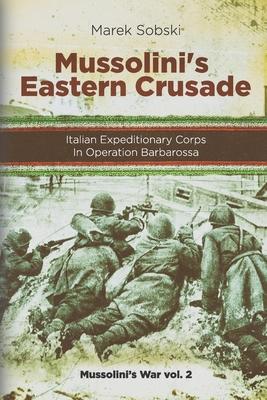Benito Mussolini was an exceptionally hot-headed politician. No wonder then that when reports from various sources began to reach him about the invasion of the Soviet Union planned by Adolf Hitler, in the blink of an eye he made the decision to accompany his friend in this new venture. The news of the enormous successes of the Wehrmacht on the Eastern Front only reinforced the decision to send representatives of the Italian armed forces to Russia in the form of the Expeditionary Corps (Corpo di Spedizione Italiano in Russia; CSIR). It was one of the most disastrous decisions of the Duce, which in time directly contributed to the collapse of the fascist regime, as the number of victims and brutality of the fighting in the east terrified the Italian public opinion, which never looked at war in such a total way as it was in the 3rd Reich or USSR.
In early July 1941, three Italian divisions and a Blackshirt Legion began their journey into the unknown. There, soldiers were to fight against a completely unknown opponent, among peoples and ethnicities of the Soviet Union oppressed by red terror and living on the verge of poverty. Italians also quickly understood that their enemy would be the climate, regardless of the season. Nevertheless, they proudly represented their country, and the period discussed in the book was indeed a time of heavy fighting, but also successes, which for Italian troops were so often missing in World War Two. At the same time, the first symptoms of impending catastrophe appeared. CSIR logistics turned out to be ineffective, the enemy's reserves of manpower seemed to be endless, and in terms of the quality and availability of weapons, he quickly began to outperform the Italians.
The book covers the first period of Italian involvement on the Eastern Front: CSIR's participation in Operation "Barbarossa" and the Soviet counteroffensive in the winter of 1941/1942. The basis for the decision to increase the Italian participation to the level of an entire army (the 8th Army, commonly known as Armata Italiana in Russia - ARMIR) is also presented. One of the chapters is also devoted to the aviation component, which was subordinated to the command of the CSIR. The book is being illustrated by 8 maps and 97 photographs of the main theme of the work as well as photo album: Operation "Barbarossa" as seen in the Italian press at the time. Table of contents: MapsIntroduction
I. Fascist Italy And The USSR (1922-1941)
II. Mussolini - An Unexpected Crusader
III. Formation Of The Corpo di Spedizione Italiano in Russia
IV. Army Group "South" In Operation "Barbarossa"
V. Workers' And Peasants' Red Army
VI. Manoeuvre at Petrykivka
VII. Italians in the Donetsk Basin
VIII. The Christmas Battle
IX. The Last Actions of the Corps
X. The decision to form ARMIR
XI. Behind the CSIR Lines
XII. The Italian Air Corps on the Eastern Front
Conclusion
Appendix 1
Italian Ranks and Appointments Used Throughout The Book And Their British Equivalents
Appendix 2
Biographies Of The High-Ranking Italian Commanders of Corpo di Spedizione Italiano in Russia
Appendix 3
Ordre de Bataille of Corpo di Spedizione Italiano in Russia
Bibliography
Photo album: Operation "Barbarossa"
